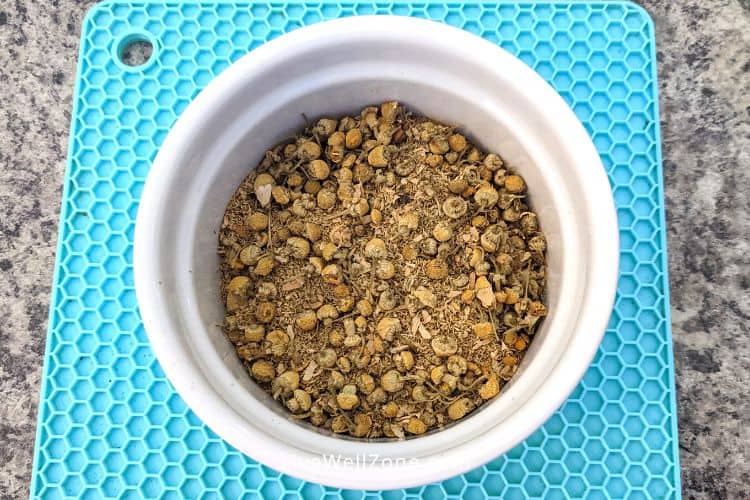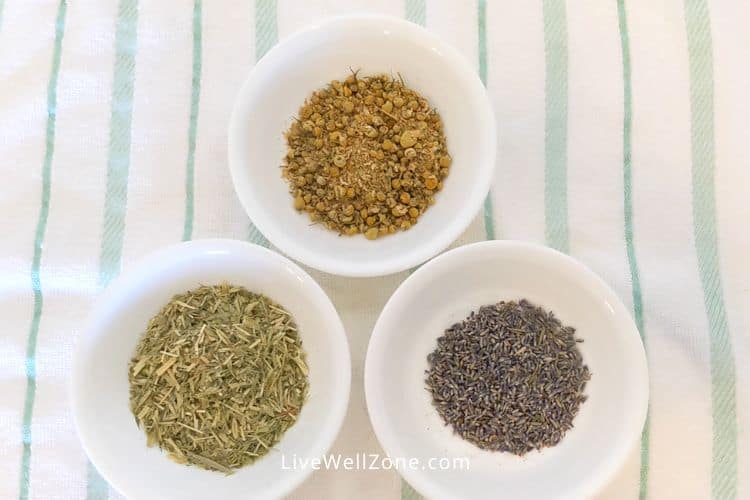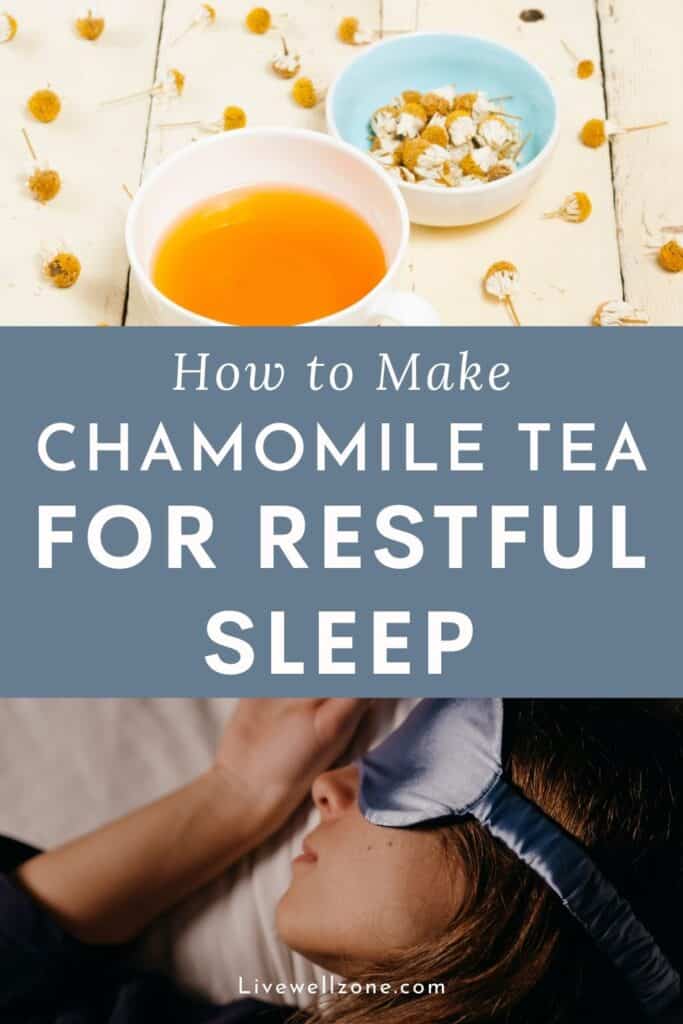
Classified as a nervine – i.e. an herb that calms the nervous system – chamomile has traditionally been used to induce relaxation and improve insomnia.
In addition, various studies – with women in postpartum, cardiac patients, children and the elderly – also suggest that chamomile may help to reduce tension and support healthy sleep (1, 2, 3).
So, in this quick guide we’re going to look at how to make chamomile tea for sleep, including:
- How much of the flower to use.
- Other herbs to combine it with.
- How chamomile helps with sleep and relaxation.
Note: this post contains some affiliate links and I earn a commission (at no additional cost to you) if you use them to make a purchase.
HOW TO MAKE AND DRINK CHAMOMILE SLEEP TEA

There are two ways to use chamomile tea for sleep: use it by itself or combine it with other herbs. Depending on the underlying cause of your sleep disturbance, the second option might be better because you can add in herbs that address various aspects of sleep.
1. Basic Chamomile Tea Recipe
Ingredients
1 cup very hot water (just below boiling temperature)
2 – 3 tsp dried chamomile (or 2 – 3 tea bags)
Raw honey (optional)
Instructions
- Place the herbs in your tea infuser of choice.
- Pour water over the herbs and cover (this prevents the essential oils from evaporating).
- Allow to steep for 15 minutes.
- Remove the herbs and enjoy. If you find the flavor too bitter, sweeten it with a little raw honey.
- Drink this tea about an hour before bedtime.
2. Chamomile, Lavender and Oat Tea Recipe
Sometimes, plain chamomile doesn’t quite do the trick. That’s when a blend comes in handy.
This particular recipe is one of my favorite because it contains:
- Oatstraw: this is one of the best nervines for when you’re feeling totally drained, frazzled and burned out. It is also very rich in minerals which the body desperately needs, especially when you’re in a state of burnout. I particularly like it because it’s not a sedative (won’t knock you out) but it is very calming.
- Lavender: another gentle and classic nervine, lavender is known to help reduce stress and tension. Just like oatstraw, it won’t necessarily knock you out, but its calming effect helps the body to naturally fall asleep.
- Catnip: this is an optional ingredient and I find it has more of a sedating effect. So, for those times when you need some extra help from your tea, consider adding catnip.
Ingredients
1 cup of hot water (just under boiling temperature)
2 tsp dried chamomile (or 2 tea bags) – get it here
2 tsp dried oatstraw – get it here
½ tsp dried lavender – get it here
½ – 1 tsp dried catnip (optional) – get it here
1 tsp raw honey (optional)
Steps
- Heat up a cup of water so that it’s just under boiling temperature.
- Place the dried herbs into a tea infuser.
- Pour the water over the herbs.
- Let the herbs steep for 15 minutes, fully covered (chamomile, lavender and catnip all have essential oils that evaporate easily).
- Remove the herbs and sweeten with honey if you’d like.
- Drink this tea approximately 1 hour before bedtime.
HOW LONG DOES IT TAKE CHAMOMILE TEA TO MAKE YOU SLEEPY?
It can take approximately 45 minutes for chamomile to induce sleep. This is mainly because the body has to metabolize the compounds that are responsible for the herb’s relaxing effects (source).
As with all herbs, remember that your own experience can be different.
So, be open to experimenting with this herb to see exactly what time frame works best for you.
BENEFITS OF CHAMOMILE TEA FOR INSOMNIA
1. Mild Sedative and Anxiolytic
Chamomile is considered a mild anxiolytic, meaning it may help with mild cases of anxiety.
This is mainly due to a family of antioxidants called flavonoids, which modulate mood hormones like dopamine, serotonin and GABA.
One of the most studied flavonoids in chamomile is apigenin.
Research indicates that apigenin binds to benzodiazepine receptors in the brain. The end result of this action is a mild tranquilizing and sleep-inducing effect (4, 5, 6).
2. Anti-inflammatory
Chamomile contains a variety of anti-inflammatory compounds, such as alpha-bisabolol and flavonoids.
This can be helpful for sleep because research shows that inflammation plays a role in poor sleep quality and inflammation is exacerbated by a lack of sleep (7, 8, 9).
Talk about a vicious cycle!
In addition, chamomile has pain-relieving and antispasmodic (stops muscle contractions) properties (10, 11).
Therefore, it’s no wonder that it has historically been used as a remedy for painful conditions like menstrual cramps, IBS and colic (source).
Interestingly, Germany’s Commission E approves the use of chamomile for spasms in the GI tract and inflammatory conditions of the GI tract (source). This matches up with some of the herb’s traditional uses.
FAQs ABOUT CHAMOMILE TEA FOR SLEEP
Is it okay to drink chamomile tea every night?
Chamomile is generally regarded as safe and therefore it can be consumed every night. However, please note that chamomile is part of the ragweed family. So, if you are allergic to ragweeds, it’s best to avoid chamomile as well.
How much chamomile tea should I drink for sleep?
In general, one cup of chamomile tea can help with sleep. However, everyone’s experience with herbs is different and you may find that one cup isn’t quite sufficient. In addition, depending your current life circumstances, you may need to adjust how much chamomile your drink.
From personal experience, I’ve found that during very stressful times, it helps to drink a nervine tea in the late afternoon/early evening (say 5 or 6 pm). Some of my favorites are a regular cup of chamomile tea (1 tsp herb to 1 cup water) or a strong oatstraw infusion.
Doing this helps the body and mind to start unwinding long before bedtime. Then when I have the actual sleep tea, it’s the finishing touch to help me sleep better.
CONCLUSION
Chamomile is versatile plant that acts as a nervine, anti-inflammatory and anxiolytic.
While there is a need for more controlled studies that use a large sample size of participants, historical usage shows that it is helpful as a natural sleep aid.
Whether you use it on its own or with other herbs, I hope this lovely flower helps you get a good night of rest.

Related Articles:
Why You Need Chamomile for Period Pain & PMS (and How to Use It)
20 Amazing Essential Oil Diffuser Recipes for Sleep


